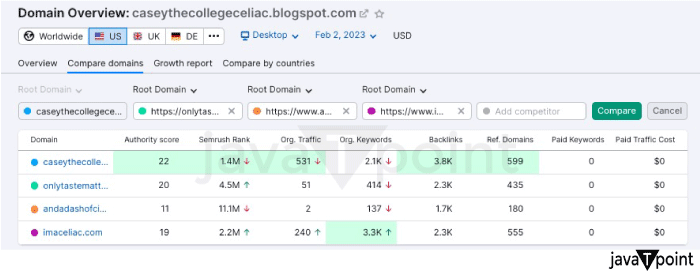Semrush Domain AuthorityWhat is Domain Authority?A search engine ranking metric called Domain Authority (DA) was created by Moz. It forecasts how highly a website will rank on Search Engine Result Pages (SERPs) based on various characteristics, including the quality of backlinks and the website's content. The DA scale runs from 1 to 100, with higher scores suggesting a better chance of ranking on SERPs. 
Semrush Domain AuthorityThe well-known all-in-one digital marketing suite Semrush gives customers access to several tools for enhancing their websites' SEO, PPC, content marketing, and social media presence. Users of Semrush may assess the domain authority of their website in addition to its many other capabilities. A statistic called domain authority (DA) assesses the power and legitimacy of a website's whole domain. A website with a higher score is considered more credible and strong. The score runs from 0 to 100. Your website is more likely to rank higher in search engine results pages (SERPs) the greater the domain authority of your website. Semrush offers users a domain authority score that considers several variables, such as the quantity and quality of backlinks, the domain's age and history, and the content's value and relevancy. Knowing your website's domain authority may help you pinpoint problem areas and develop a more successful SEO strategy. How to Calculate Domain Authority Using a Proprietary Algorithm
Why is Domain Authority Important?Because it can be used to forecast a website's potential search engine ranking, Domain Authority is a crucial metric. High DA websites are more likely to appear on the first page of search engine results for pertinent keywords, which may enhance organic traffic, leads, and sales. Monitoring a website's DA may also assist companies in determining where their SEO strategy needs work. A website's low DA can indicate that its backlink profile or content quality needs improvement. How does Semrush's Domain Authority Work?The Domain Authority of Semrush is derived using a proprietary algorithm that considers numerous criteria, such as the amount and quality of backlinks, referring domains, organic search traffic, content quality, social media metrics, and user behavior. Let us examine each of these aspects in further detail:
After considering these criteria, Semrush's algorithm generates a score of 0 to 100, with higher scores suggesting a better backlink profile and more potential for higher search engine rankings. Domain Authority Metrics from Semrush
Semrush offers customers a selection of domain authority indicators that may be used to assess the strength and authority of the domain underlying their website. These metrics consist of the following: 1. Domain Score (DS) Semrush's Domain Score (DS) is a metric that assesses the overall power and legitimacy of a website's domain. Higher ratings indicate a stronger and more authoritative domain. It runs from 0 to 100. 2. Authority Score (AS) The authority of a website's backlink profile is gauged by the authority score (AS) provided by Semrush. Higher scores indicate a more authoritative backlink profile; the scale runs from 0 to 100. 3. Trust Score The Semrush trust score (TS) is a statistic that assesses the reliability of a website's backlink profile. Higher scores indicate a more trustworthy backlink profile; the scale goes from 0 to 100. 4. Backlink Profile Semrush gives consumers comprehensive data about their website's backlink profile, including the quantity, caliber, and referring domains of backlinks. Semrush Domain Authority Advantages1. Helps to Identify Areas for Improvement Understanding your website's domain authority will assist you in identifying areas where your SEO approach needs to be improved. You may find areas that need improvement and develop a strategy to solve them by examining your website's backlink profile and content quality. 2. Improves Your SEO Strategy Enhances your SEO approach by comprehending your website's domain authority, and you may develop a more successful SEO plan. You may concentrate on constructing trust-worthy backlinks, enhancing your content's quality and relevancy, and optimizing your website's search engine. 3. Helps You Compete with Rivals Being aware of the domain authority of your website might assist you in outperforming rivals. You may find areas where you can improve and develop a more effective plan to compete with them by examining their domain authority and backlink profile. 4. Increases Your Website's Visibility You may boost your website's visibility in search engine results pages (SERPs) by increasing your domain authority. The more highly your website ranks in search engine results pages (SERPs), the more traffic and visibility it will receive. 5. Increases Audience Trust and Credibility A high domain authority score might aid in increasing audience trust and credibility. It demonstrates the authority and reliability of your website, which can boost audience trust in your name and your content. How to Improve Your Domain AuthorityA thorough strategy that concentrates on developing high-quality backlinks, producing high-quality content, and search engine optimizing your website is necessary to increase your domain authority. The following advice can help you increase your domain authority: What Steps Can Companies Take to Increase Their Domain Authority?A long-term, all-encompassing strategy for SEO is necessary to increase a website's Domain Authority. Here are a few methods companies can use to raise their Domain Authority:
Limitation of Semrush's Domain AuthoritySemrush's Domain Authority is a great tool for companies, but there are several restrictions that users need to be aware of. A few of the limitations include: 1. The Domain Authority Measure Used by Semrush is not One that Google Uses.It's crucial to remember that Google or any other search engine does not formally utilize Semrush's Domain Authority as a ranking factor. It's vital to bear in mind that Semrush's Domain Authority is not an official ranking criterion utilized by search engines, even though it is based on a proprietary algorithm that takes into account several variables, including backlink profile, traffic, content quality, social media metrics, and user behavior. Because of this, companies shouldn't base their SEO strategy exclusively on Semrush's Domain Authority. 2. Domain Authority Provided by Semrush is Not Always ReliableAlthough Semrush's Domain Authority can be a helpful tool for estimating a website's potential for high search engine rankings, it's important to remember that it isn't always reliable. Semrush's Domain Authority may not correctly reflect a website's total backlink profile or SEO performance because it is based on a sample of backlinks and other variables. Additionally, because search engine algorithms are complex and consider various factors besides backlink profiles, Semrush's Domain Authority may not always accurately predict a website's search engine rankings. 3. Semrush's Domain Authority Does Not Consider On-Page SEO FactorsSemrush's Domain Authority has another drawback; it ignores on-page SEO elements like title tags, Meta descriptions, and header tags. On-page SEO elements are still crucial ranking variables that can improve a website's search engine visibility, even if they might not have as much of an impact on a website's overall SEO performance as backlinks. Consequently, companies should not base their SEO strategy exclusively on Semrush's Domain Authority but instead on optimizing their on-page SEO variables. 4. The Most Recent Updates to Search Engine Algorithms Might not be Reflected in Semrush's Domain AuthorityThe ranks and visibility of a website in search results might fluctuate over time since search engine algorithms are continually changing. Semrush's Domain Authority might not always reflect the most recent updates to search engine algorithms, making it difficult to forecast how well-positioned a website will be in search results. As a result, companies should periodically check the effectiveness of their SEO efforts and modify their plans as necessary to ensure ongoing advancement. 5. The Domain Authority of Semrush may not Accurately Indicate the Quality of a Website's ContentWhile Semrush's Domain Authority considers several factors, including content quality, it may not always accurately reflect a website's content quality. Organizations should concentrate on providing high-quality, relevant, and engaging content to boost their SEO performance. However, Semrush's Domain Authority may not always accurately reflect the quality of a website's content, so businesses should use additional metrics and tools to evaluate the quality of their content. 6. Domain Authority from Semrush may not Correctly Represent Local Search Engine ResultsFinally, remember that Semrush's Domain Authority might not accurately reflect local search engine rankings. Several factors influence local search engine rankings, including the website's location, relevance, and prominence. While Semrush's Domain Authority can be used to predict a website's overall search engine ranking potential, it may not accurately reflect that potential for local search engine ranking. As a result, companies should concentrate on local search engine optimization tactics such as optimizing their Google My Business page, establishing local citations, and targeting local keywords to boost their local search engine ranks. 7. It's a Proprietary MetricSemrush's Domain Authority is a private statistic, which implies that its mechanism and computation are not publicly available. While Semrush provides some information about the factors influencing the score, the exact algorithm and calculation are not disclosed. As a result, businesses may find it challenging to completely comprehend how their Domain Authority score is determined and how to increase it. What is a Good Semrush Domain Authority Score?A good Semrush domain authority score varies based on your website's sector and competitors. A domain authority score of 50 or more is regarded well in general. A higher domain authority score may be required to rank well in search engine results pages (SERPs) if you are in a highly competitive business or niche. It is vital to remember that domain authority score is a relative statistic, which means that your website's domain authority score is only useful when compared to your competitors' domain authority ratings. For example, if your website has a domain authority score of 50 but your rivals have scores of 60 or higher, you may need to strengthen your backlink profile to boost your domain authority. How is Semrush Domain Authority Calculated?The Semrush domain authority score is determined by a complicated algorithm that considers several parameters linked to a website's backlink profile. The algorithm is based on a mix of quantitative and qualitative elements, such as:
The Semrush domain authority score ranges from 1 to 100, with higher scores suggesting a better backlink profile. The score is updated regularly, usually monthly, to reflect changes in a website's backlink profile. Remembering that the Semrush domain authority score is a relative measure, your website's domain authority score is only useful compared to your rivals' domain authority ratings. ConclusionDomain Authority from Semrush is useful for organizations trying to boost their online presence and search engine exposure. It assesses the total strength of a website's backlink profile and forecasts its potential for search engine ranking. Businesses may analyze their SEO success and change their SEO strategy by watching their Domain Authority score over time. Domain Authority from Semrush may also be used to compare a website's performance to rivals, uncover chances for link development, and establish an SEO plan. However, it's important to remember Semrush's Domain Authority has limitations. It is a proprietary statistic that is not an official Google metric and does not consider all of the elements that might influence a website's search engine exposure. To analyze their SEO performance and evolve their SEO strategy, businesses should utilize Semrush's Domain Authority with other SEO metrics and tools. Page speed, on-page SEO variables, local search engine rankings, and user behavior analytics are also crucial. Semrush's Domain Authority is a useful tool that may aid companies in enhancing their online presence and search engine exposure. Businesses may create a thorough SEO plan that promotes website traffic and income by being aware of its limits and using it with other SEO metrics and tools.
Next TopicSemrush Download
|
 For Videos Join Our Youtube Channel: Join Now
For Videos Join Our Youtube Channel: Join Now
Feedback
- Send your Feedback to [email protected]
Help Others, Please Share










